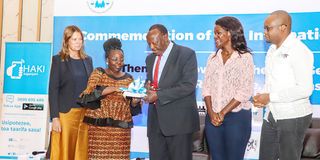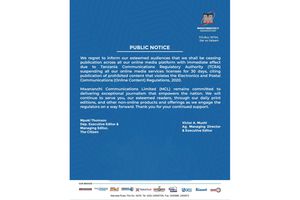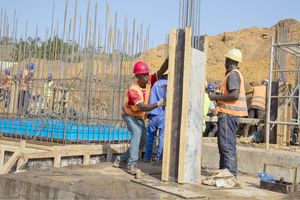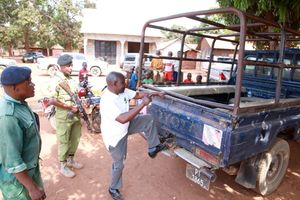New constitution, free electoral body dominate Democracy Day

The Legal and Human Rights Centre (LHRC) executive director, Dr. Anna Henga (second left), and the chairman of the Tanzania Centre for Democracy (TCD), Prof. Ibrahim Lipumba (third right), cut a ribbon during the launch of a book titled “Thirty Years of Multiparty Democracy in Tanzania, 1992-2022, in Dar es Salaam yesterday.
Photo | Sunday George
What you need to know:
- Stakeholders from various backgrounds discussed critical issues facing the nation and charted a way forward for the next three decades.
Dar es Salaam. The need for a new constitution and the establishment of an independent electoral body dominated discussions during a meeting of stakeholders to commemorate 30 years of multi-party democracy in Tanzania.
Stakeholders from various backgrounds discussed critical issues facing the nation and charted a way forward for the next three decades.
Under the theme “Empowering the Next Generation for Reconciliation, Resilience, Reforms, and Rebuilding (4Rs),” the participants identified key challenges and proposed solutions for the advancement of democracy.
Executive director of the Legal and Human Rights Centre (LHRC), Dr. Anna Henga, underscored the importance of the reforms, saying: “The past 30 years have posed significant democratic challenges. We now see a glimmer of hope that, with a well-thought-out strategy and commitment from all parties, we can achieve this national responsibility.”
President Samia Suluhu Hassan’s endorsement of a new process for rewriting a new constitution was highlighted as a significant step forward.
Participants said the proposed constitutional reforms should go hand in hand with the establishment of an independent electoral commission to ensure fair and transparent elections.
The issue of corruption during elections, which has disenfranchised many citizens without financial resources, also came under scrutiny.
Participants called for robust measures to combat corruption in the electoral process, ensuring all eligible candidates have an equal chance to participate, regardless of their financial status.
The event also underscored the importance of inclusivity in democratic affairs.
A law lecturer from the Open University of Tanzania (OUT), Dr. Victoria Lihir, expressed concern over the underrepresentation of women in politics.
“Since the advent of multi-party politics, only 9.4 percent of women have been elected to parliament,” she noted. With only 26 women out of 264 MPs in the current parliament, there is a long road ahead to achieve gender parity.
The participants also stressed the need for legislative and societal changes to promote women’s participation in politics.
The main opposition party’s Catherine Ruge emphasized the need to allow independent candidates to contest elections.
ACT-Wazalendo leader Zitto Kabwe called for a change in laws to allow free and fair elections in the forthcoming local government elections.
Veteran politician Stephen Wassira acknowledged the vital role played by civil organizations in advocating for democratic changes over the past 30 years. He urged them to remain independent and continue advocating for necessary reforms.
The gathering was optimistic that the critical issues discussed during the event will shape the nation’s democratic future.
The call for a new constitution, an independent electoral commission, anti-corruption measures, and increased inclusivity will guide the democratic agenda,” they said.
“We believe that with the right strategy and goodwill from all parties, we can make significant democratic strides,” said a participant.
As Tanzania continues its journey towards a stronger democracy, the commitment of its citizens and leaders will play an important role in shaping the nation’s future, they affirmed.





